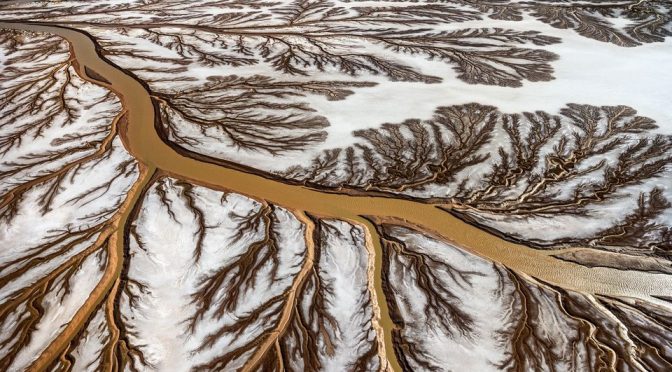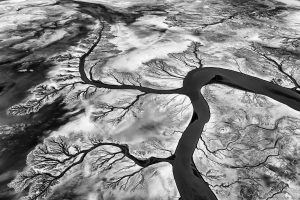
Edward Fishman on Bloomberg: Global Energy Policy
Edward Fishman joins Bloomberg on October 30, 2025. Edward Fishman is one of the world’s foremost experts on economic statecraft, with deep experience shaping U.S.…
Thought Leader: Edward Fishman

“There is not a fragment in all nature, for every relative fragment of one thing is a full harmonious unit in itself.” — John Muir, A Thousand Mile Walk to the Gulf (1916)
What is a human being? Who are we, and why are we here? Those are just some of the basic questions I have wrestled with my whole life.
When I first flew over the Colorado River Delta in a two-seater plane, thousands of miles from where I grew up in Canada’s far north, I had no idea what to expect. I honestly believed that, looking down from 10,000 feet, it would look like these little fingers coming out of the river. When I actually set eyes on it, I saw it was five miles of sheer beauty, a landscape on a scale so vast and wide that at first I didn’t know how to photograph it.


“Arterial Poetry”
The task before me was to find a way to make beautiful and different images of a scene that almost took the breath away while conveying a message of life and renewal. My pilot Rodrigo and I started honing in at different altitudes, anywhere from 200 feet to 1,000 feet. The lower we went, the more it felt like we were flying through a three-dimensional canvas of poetry and art. To see these patterns was to be reminded of the tree of life, a quilted mosaic of silt and sediment — veins, capillaries, and branches woven intricately together, the lungs of the Earth. I was momentarily lost trying to figure out a way to turn these patterns of life into photographic moments that could live on people’s walls.


“Arbol de Vida”
It is beautiful, but this is a terrible beauty. For the story of the Colorado River since the 1950s has been a story of how an overburdened river no longer reaches the sea. It is a journey that starts high in the Rocky Mountains and winds through seven US states, over 1,500 miles of alpine forests, red rock canyons and desert floodplains to northwest Mexico, where it once emptied into the Sea of Cortez.
In the 1940s, as the population of the American Southwest and the Mexicali Valley grew, the US and Mexico signed a water-sharing agreement to govern the distribution of water from the Colorado River. This agreement drained nearly every drop of water from the river; in little more than a decade, the delta’s emerald lagoons and riparian forests withered in the hot sun and burned away to form a treeless desert. By the 1970s, Lake Powell filled behind Glen Canyon Dam, and water no longer flowed through the delta. The landscape began to die.
The region is experiencing the worst drought in 1,200 years, but that is only part of the story. The Colorado River is also a story of how human population and heavy industry have denuded, drained, and decayed one of the natural world’s great waterways.


“Gaia’s Lungs”
And yet, now, today, depending on when the drought finally ends, there is hope.
Thanks to a 2012 agreement between the US and Mexico that reallocated water to the delta for re-wilding purposes, small but consistent “base flow” water releases from the Morelos Dam, which straddles the US-Mexico border, to the delta has allowed the Colorado River to reach the sea for the first time in decades, if only as a trickle. Despite the lingering drought — a clear sign of climate change — studies project that by 2026 the delta could receive an additional 200,000 acre-feet of water, which will help restore thousands of acres of wetlands and sanctuaries for migratory birds. We know that avian diversity increases with even a modest amount of water. Every drop makes a difference.
Those efforts have provided new hope for the future.


“Written in Water”
As a society, we face some of the most pressing challenges today most of us can remember in our lifetimes. And yet, there is reason for hope, all because of the efforts of a small but dedicated group of people.
This matters. Life matters. We can turn the clock back — if not all the way, then at least partly there. What we have seen over stretches of the Colorado River Delta is proof of nature’s extraordinary resilience and resistance, even in the face of extraordinary challenges.
I will return one day, and I hope you will join me on my journey.


“Arterial Shadows”
Edward Fishman on Bloomberg: Global Energy Policy
Edward Fishman joins Bloomberg on October 30, 2025. Edward Fishman is one of the world’s foremost experts on economic statecraft, with deep experience shaping U.S.…
Thought Leader: Edward Fishman
Peter Zeihan: Trump Pulls the Trigger on Russia
After months of being played by the Russians, it seems US President Donald Trump has had enough. On 23 October the United States has fully…
Thought Leader: Peter Zeihan
On this episode of Simply Money presented by Allworth Financial, Bob and Brian welcome former Cleveland Fed President Dr. Loretta Mester for a rare insider’s…
Thought Leader: Loretta Mester

